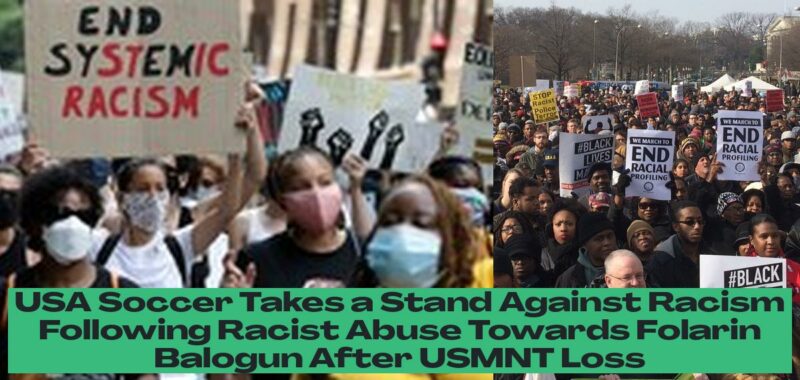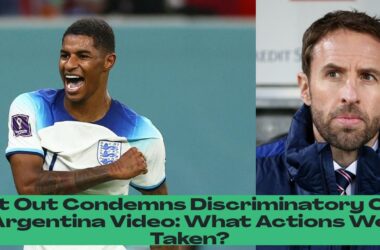US Soccer’s Stance Against Racism Following USMNT’s Copa America Loss
Oh, the tangled webs we weave on social media! It’s like a virtual jungle out there, where some people seem to have mistaken their keyboards for a vine and their minds for a monkey swinging from tree to tree.
Now, let’s tackle the recent saga in the world of the US Men’s National Team (USMNT). Following an unexpected 2-1 loss to Panama in the Copa America, things took a dark turn online. Tim Weah and other USMNT players found themselves caught in a storm of racist messages flooding their social media accounts. But it didn’t stop there.
Folarin Balogun, one of USA’s forwards, bravely stepped forward to expose the racially abusive messages that invaded his Instagram DMs. The vile contents? Monkey emojis — because apparently, some people still reside in prehistoric times.
In response to this despicable display of ignorance and hatred, USA soccer did not hesitate to take a stand. The United States Soccer Federation swiftly condemned the online racist abuse targeted at its players post-match against Panama. A clear message was sent: racism has no place in sports or anywhere else for that matter.
An apology might be easy for some but handling racism? That’s another ball game altogether. Let’s dive into why it’s crucial to call out such behavior and explore how we can advocate for a fairer playing field both on and off-screen:
Let us venture further into this riveting tale of resilience against racism in sports – stay tuned for insights that strike a chord with your passion for justice!
Folarin Balogun’s Revealing of Racist Abuse Highlights Bigger Issue
Folarin Balogun’s brave act of exposing the racist abuse he received on Instagram sheds light on a larger issue within the realm of sports and beyond. The recent wave of discriminatory messages targeting USMNT players like Balogun and Chris Richards has sparked outrage and concern from U.S. Soccer. The disturbing fact that individuals feel empowered to spew such hate online highlights a pressing need for greater awareness and action against racism in all its forms.
The revealing of these racist DMs showcases the ugly side of social media, where anonymity often emboldens people to express their prejudiced views without consequence. It is essential to address this toxic behavior head-on, both to protect athletes from such harmful attacks and to create a safer online environment for everyone. By standing up against racism in sports, organizations like U.S. Soccer send a powerful message that discrimination has no place in the realm of athletics or society as a whole.
Moving forward, it is crucial for individuals, fans, and institutions alike to actively challenge and combat racism wherever it rears its ugly head. Whether it’s speaking out against hateful rhetoric online or advocating for policies that promote inclusivity and diversity, each one of us has a role to play in fostering a more equitable world. By amplifying voices like Balogun’s who refuse to stay silent in the face of adversity, we can work towards creating a culture where respect and acceptance prevail over bigotry and intolerance.
Have you ever encountered discriminatory behavior online? How do you think we can collectively contribute to combating racism not just in sports but in all aspects of life? Your thoughts and actions matter in shaping a more inclusive future for us all!
Tim Weah and USMNT Players Face Racist Messages Post 2-1 Defeat
After the recent 2-1 defeat of the US Men’s National Team in the Copa America, players like Tim Weah, Folarin Balogun, and Chris Richards faced a disturbing wave of racist messages on social media. Balogun and Richards bravely exposed the hateful abuse they received by sharing screenshots of racist direct messages and comments on their Instagram stories. This unfortunate incident sheds light on the prevalence of racism towards soccer players globally, highlighting a persistent issue that U.S. Soccer is committed to addressing.
The revelation of these discriminatory messages underscores the toxicity that anonymity can breed online, empowering individuals to express prejudiced views without accountability. It is crucial for organizations like U.S. Soccer to take a firm stand against racism in sports and beyond. By condemning such behavior swiftly and unequivocally, they send a strong message that discrimination has no place in athletics or society as a whole.
To combat racism effectively, it is essential for everyone—from fans to institutions—to actively challenge discriminatory behavior wherever it surfaces. Whether it’s calling out hateful rhetoric online or advocating for initiatives that promote diversity and inclusivity, each person contributes to creating a more equitable world. By amplifying voices like Balogun’s who refuse to remain silent in the face of adversity, we take meaningful steps towards building a culture where respect and acceptance triumph over bigotry and intolerance.
Have you ever witnessed or experienced discrimination online? How do you think we can collectively work towards eradicating racism in sports and beyond? Your thoughts and actions play a vital role in shaping a future where equality prevails over hatred—let’s stand together against all forms of discrimination!
- Racism has no place in sports or anywhere else for that matter, as emphasized by USA soccer’s swift condemnation of the online racist abuse targeted at its players post-match against Panama.
- Folarin Balogun’s brave act of exposing the racist abuse he received on Instagram sheds light on a larger issue within the realm of sports and beyond, highlighting the pressing need for greater awareness and action against racism in all its forms.
- The recent wave of discriminatory messages targeting USMNT players like Balogun and Chris Richards underscores the ugly side of social media, where anonymity often emboldens people to express their prejudiced views without consequence.
- Addressing toxic behaviors like online racism is crucial to advocating for a fairer playing field both on and off-screen, emphasizing the importance of standing up against hate and discrimination in all its manifestations.









